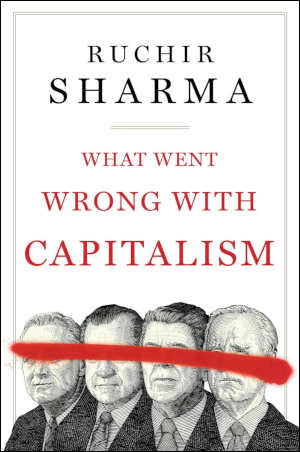What Went Wrong with Capitalism
- Auteur: Ruchir Sharma (Verenigde Staten)
- Soort boek: economieboek
- Taal: Engels
- Uitgever: Simon & Schuster
- Omvang: 384 pagina’s
- Verschijnt: 11 juni 2024
- Uitgave: gebonden boek / ebook
- Prijs: $30.00 / $14.99
- Boek bestellen bij: Amazon / Bol / Libris
Ruchir Sharma What Went Wrong with Capitalism recensie
Mochten er in de media een boekbesprekingen, reviews of recensies verschijnen van het boek What Went Wrong wit Capitalism, geschreven door Ruchir Sharma, dan besteden we er op deze pagina aandacht aan.
- “Ruchir Sharma is unparalleled! He uses a wealth of facts, data, and history to put forward brilliant, thought-provoking commentary.” (Fareed Zakaria, CNN host)
- “At a moment at which democracy and free markets are under intense challenge all over the world, we are lucky that the brilliant and incomparable Ruchir Sharma has brought us a characteristically original and provocative book that tells us how to understand the ways that capitalism is falling badly short. Everyone should read, absorb and debate Sharma’s wise arguments.” (Michael Beschloss, historian and author)
- “This book will reshape how you think about the world. It is bound to provoke people on both the left and the right.” (Larry Summers, former Secretary of the Treasury)
Flaptekst boek over het kapitalisme van Ruchir Sharma
A century of expanding government has distorted financial markets, stoked massive inequality, and soaked America in debt. Capitalism didn’t fail, it was ruined…
What went wrong with capitalism? Ruchir Sharma’s account is not like any you will have heard before. He says progressives are right, in part, when they mock modern capitalism as “socialism for the rich.” For a century, governments have expanded in just about every measurable dimension, from spending to regulation and the scale of financial rescues when the economy wobbles. The result is expensive state guarantees for everyone—bailouts for the rich, entitlements for the middle class, welfare for the poor.
Taking you back to the 19th century, Sharma shows how completely the reflexes of government have changed: from hands-off to hands-on, from doing too little to help anyone in hard times to today trying to prevent anyone suffering any economic pain, ever. Trading sins of omission and indifference for excesses of spending and meddling, governments from the United States to Europe and Japan have pumped so much money into their economies that financial markets can no longer invest all that capital efficiently.
Inadvertently, they have fueled the rise of monopolies, “zombie” firms, and billionaires. They have made capitalism less fair and less efficient, which is slowing economic growth and fueling popular anger. The first step to a cure is a correct diagnose of the problem. Capitalism has been badly distorted by constant government intervention and the relentless spread of a bailout culture. Building an even bigger state will only double down on what ruined capitalism in the first place.
Bijpassende boeken
- Nieuwe economieboeken
